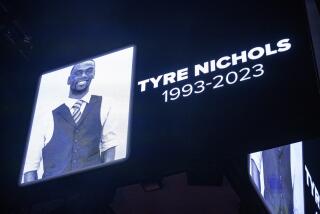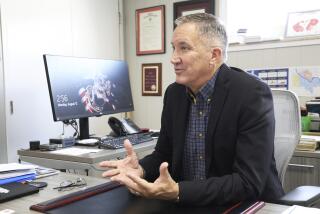Cost of Vengeance Divides Oklahoma
McALESTER, Okla. â When Bill Rayburn says that death is the easy way out, folks around here tend to listen.
At 87, Rayburn is old enough to remember how the Great Depression nearly snuffed out small towns like this. He nearly lost his life in the Battle of the Bulge, earned two Purple Hearts in three wars and has seen things on a battlefield that gentlemen donât speak about in public.
Sure, he says, he wants to see Oklahoma City bombing conspirator Terry Nichols die. He just wants it to take a while. And like many others here, he disagrees with Oklahomaâs decision to embark on a costly trial that will resurrect the agony of the 1995 federal building bombing -- not when Nichols, 48, has already been convicted in a federal trial, and is serving a life term without possibility of parole.
âA life sentence penned up like an animal is a much worse punishment than death,â Rayburn said last week in McAlester City Hall, where clerks still greet him as âMr. Mayorâ in homage to his three terms in office in the 1980s. âThere is no way to ever compensate for the loss of lives and the tragedy of that day. Even if it ends in conviction, what have we gained?â
When state prosecutors file into the Pittsburg County courthouse in McAlester on Monday morning to pick a jury in the Nichols case, having outlasted nine years of legal wrangling, it would seem to be a triumph of endurance and determination. Instead, Oklahoma is deeply divided and conflicted, not over Nicholsâ guilt, but over whether the trial is an exercise in redundancy and futility that this state, literally, cannot afford.
Nichols was convicted of conspiracy and involuntary manslaughter in 1997 in the deaths of eight federal law enforcement agents who were killed in the bombing of the Alfred P. Murrah Federal Building.
State prosecutors are trying him on 161 counts of first-degree murder -- one count for each of the others killed in the bombing, including a fetus. They are seeking the death penalty.
In a sparsely populated state, whose schools, highways and social programs are often in dire need of funds, taxpayers have already paid more than $4 million to cover the costs of Nicholsâ prosecution, defense and security.
At least 11 lawyers and investigators are working full time on Nicholsâ behalf. Five prison guards have been assigned to watch his cell and his activities 24 hours a day ever since he was transferred to Oklahoma from Coloradoâs Supermax prison.
Some analysts believe the cost of the trial, which was moved to McAlester in an effort to find an impartial jury, will exceed $10 million. The investigation into the bombing and the federal trials of Nichols and bomber Timothy McVeigh -- who was executed in July 2001 -- cost nearly $100 million.
McAlester, with about 19,000 people, is often regarded as the epicenter of the Bible Belt. It is the largest city in the southeast corner of Oklahoma. Compared to other towns in the area, McAlester is holding up in the face of a soured economy. Construction, for instance, has begun at the high school to build a new wing, and a new Boys & Girls Club community center is about to open.
But signs of poverty can still be found along virtually every street, from sagging, abandoned barns to the tattered flag that hangs in front of the agricultural exposition hall. After weathering a storm of crack abuse in the 1990s, police say they are now combating soaring use of methamphetamine. The city is starting to watch its budget. New Police Chief Jim L. Lyles said McAlesterâs 46 commissioned officers are in cramped quarters, but momentum for building a new police station has âfizzled.â
Merchants in the business district, where two stores have closed in the last year, say they fear that lawyers and others involved in the trial are going to take up parking spots, hurting business even more.
âWe wish we could fix the economy, but we canât. Itâs been slow,â said Connie McPherson, who with her sister is a third-generation owner at Rene & Royâs Western Apparel and Rustic Home Furnishings, one of the largest stores in town. âAs far as the trial, I think weâve done our jobs in this state. It should be over.â
In a poll conducted by the Tulsa World in January, more than that 70% of residents felt similarly.
âThis case is the high price of vengeance, not just in financial terms, but in all the other terms -- the immense pain and agony and time and strain on the court system,â said Stephen B. Bright, director of the Southern Center for Human Rights, a nonprofit group that addresses civil rights and corrections issues in the South. âThere is one purpose for this and one purpose only: the death penalty.â
Citing a gag order that has been imposed in the case, lawyers on both sides and state officials declined to comment.
Relatives of bombing victims defended the trial.
âPeople are putting a dollar figure on human life, and thatâs not right,â said Doris Jones of Norman, Okla., whose daughter, Carrie Lenz, 26, was killed in her ninth-floor office in the bombing.
âI understand that it costs a lot of money,â said Jones, 55. âBut if thatâs what it costs, then thatâs what it costs. I will feel some relief just knowing that when the trial starts, that [Nichols] is charged with my daughterâs murder.â
Relatives argued that no one has ever been brought to trial for most of the deaths that occurred that day. The federal charges against Nichols were brought specifically in connection with the deaths of federal agents, not the civilians who made up the bulk of the victims. McVeigh was never tried by the state.
The relatives also remain angry that Nichols was not sentenced to death in the federal case. Nichols was not present in Oklahoma City on the day of the bombing, and prosecutors struggled to prove that he was anything more than an assistant to McVeigh.
âIf he were to get the death penalty, if it happens in my lifetime, then I think I would feel a sense of relief,â Jones said.
Even if Nichols is convicted at the state trial and sentenced to death, he may never be executed. His lawyers are expected to appeal a conviction, partly on the argument that he could not receive a fair trial in Oklahoma. And a U.S. district judge, in moving the federal trials of Nichols and McVeigh to Denver, has already ruled that âthere is so great a prejudice against these two defendants ... that they cannot obtain a fair and impartial trial at any place ... in the state.â
âThe bombing was the most outrageous group of homicides that have occurred in my lifetime,â said Garvin A. Isaacs, a prominent Oklahoma City lawyer who lost two friends in the bombing. âBut as a lawyer, we need to be mindful of the fact that trials are held for the benefit of the accused. They donât exist for judges or lawyers. Every person in this state knows about this. How can Nichols receive a fair trial?â
Jeannine Gist, 68, of Midwest City, Okla., says it is immaterial whether Nichols appeals or is executed. She just wants someone held accountable for the death of her 32-year-old daughter, Karen Carr.
âThis was a premeditated act designed to murder as many people as possible,â she said. âHe needs to be held responsible. They promised us a trial.â
More to Read
Sign up for Essential California
The most important California stories and recommendations in your inbox every morning.
You may occasionally receive promotional content from the Los Angeles Times.











